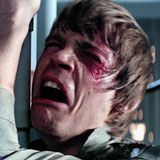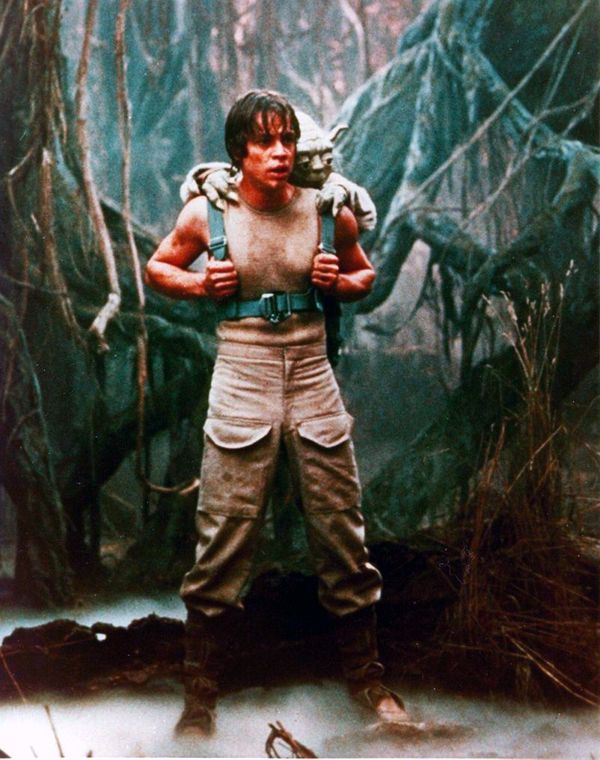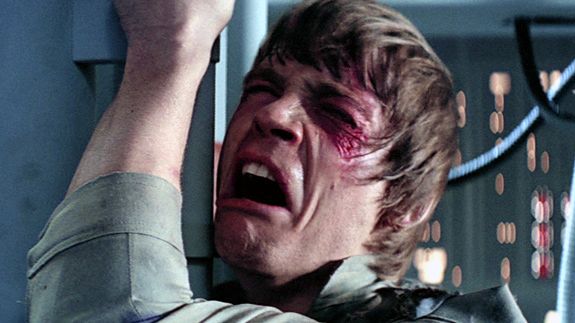MOVIE URBAN LEGEND: Darth Vader was not originally Luke Skywalker's father in The Empire Strikes Back.
Earlier this month, Michael Schur, showrunner of Parks and Recreation and co-creator of Brooklyn 99, had an amusing tweet poking at a little bit of a plot hole in the Star Wars films:
"Owen, you must hide this baby, at all costs, from Anakin Skywalker."
"Okay. Should we continue to call him Luke Skywalker?"
"Seems fine."
The reason that plot point didn’t exactly make sense is because originally Anakin Skywalker wasn’t Darth Vader. It’s fairly well known among even casual Star Wars fans that George Lucas' original plans for "The Star Wars" were drastically different from what made it into the first film. That’s the basis for Dark Horse’s current miniseries The Star Wars, based on the filmmaker’s original draft. However, as it turns out, there were still drastic changes to be made in his plans, even after the first film, all the way up through the original screenplay for The Empire Strikes Back. Read on to learn how the tragic death of a sci-ii legend might have re-shaped the Star Wars universe forever!
While I’m sure there are other couples who could challenge them, Edmond Hamilton and Leigh Brackett are likely the most accomplished married couple in the world of science fiction literature. Hamilton was one of the earliest adopters of the genre in the pulps during the 1920s and 1930s; he popularized the famous pulp fiction science hero Captain Future (although he didn’t actually create the character) and worked on a number of notable comic books later in his life, including being the primary developer of Jerry Siegel's creation, the Legion of Super-Heroes. Brackett started working in science fiction during the 1940s (she married Hamilton in 1946) and after taking a break in the mid-‘40s to become a Hollywood screenwriter (her most famous work from this time was the crime thriller The Big Sleep, a film so complicated that there’s even an urban legend about Brackett and her fellow screenwriters not understanding the plot themselves), she returned to science fiction full-time in 1949. She still worked on films after 1949 (including such notable features as 1959's Rio Bravo, 1967's El Dorado, 1970's Rio Lobo, all three for Howard Hawks, who directed The Big Sleep and 1973's The Long Goodbye, a remake of The Big Sleep), but she devoted herself primarily to writing science fiction short stories and novels.
Oddly enough, then, before Lucas commissioned her to write the screenplay for the sequel to Star Wars in 1977, Brackett had never actually written a sci-fi film. As I discussed ina recent Movie Legends Revealed about whether the Wampa attack in The Empire Strikes Back was written into the film to address Mark Hamill's facial injuries, Lucas had a general plot outline for the Star Wars sequel in 1977. He discussed it with Brackett, and then she went off and wrote her first draft of the screenplay; it was delivered it to Lucas in February 1978. Tragically, it was the last piece of work Brackett ever did, as she succumbed to cancer soon after turning the draft.
Brackett's draft is essentially the basic plot of The Empire Strikes Back: the Battle of Hoth, Luke going off to train with an old Jedi master (although it’s Minch, not Yoda, in Brackett's screenplay), Han and Leia meeting up with Lando, who betrays them to Darth Vader so they can be used as bait to draw Luke into a trap.
The major differences in Brackett's story are: Han isn’t captured; Luke doesn't lose a hand; Luke does have a twin sister, but it might not be Leia; and, most importantly, not only is Vader not revealed to be Luke's father, but Luke actually gets to meet his father, or at least the spirit of him, during his training at Dagobah (called Bog World in Brackett's version).
Here is what Luke's father had to say to say to him:
Skywalker: You've grown well, Luke, I'm proud of you. Did your uncle ever speak to you about your sister?
Luke: My sister? I have a sister? But why didn't Uncle Owen?
S: It was my request. When I saw the Empire closing in, I sent you both away for your own safety, far apart from each other.
L: Where is she? What's her name?
S: If I were to tell you, Darth Vader could get that information from your mind and use her as a hostage. Not yet, Luke. When it's time...
Luke. Will you take, from me, the oath of a Jedi knight?
Luke then takes the oath. The confrontation at the end of the film between Luke and Vader then becomes more of what we eventually see in Return of the Jedi, with Luke attacking Vader so savagely that he begins to lose control and tap into the Dark Side of the Force. Vader does want Luke to join him, but not as a son with his father, but just as an ally.
Before the final confrontation, Minch has Luke test himself against a simulation of Vader, who tempts Luke with what the Dark Side can offer:
Darth: You're in love with Leia. You don't want to lose her to Han Solo...but you will, if you lack the courage to use the strength that's in you. A strength as great as mine, Luke. If you join with me, nothing can stand against us.
Luke: What about the Empire?
D: The Empire is a passing phase. We would rule instead. You and I. The Emperor is a harsh master. You would not be. You could restore the peace, put a stop to the killing. How much good you could do, Luke! Don't be afraid. Reach out, grasp the stars. They're yours for the taking.
Luke has to run away from the simulation of Vader, leading Minch to believe the young Jedi isn’t ready to confront Vader yet; however, Luke must do so to rescue his friends. In the end, he manages to pull away from the Dark Side, even as Vader taunts him about his father:
You don't stand a chance against me ... No more than your father did, anyway.
So Luke finds the strength to not only resist killing Vader but also to manage to escape without Vader killing him. Still, he knows the Dark Side is inside of him. As the film ends, Luke is a changed man but one ready for the next adventure.
Lucas had a lot of problems with Brackett's screenplay, as it seems like her style and his clashed. He wanted the ending to be a lot darker and for the heroes to be in a lot more danger at the end of the film. But in addition, he wanted to go over the idea of Vader and Luke's father with Brackett. However, was never able to have her revise the screenplay (that is if he was ever even going to go that route; I could easily see him replacing her on the project), and instead Lucas had to come up with the new plot elements himself. After revising the screenplay, Lucas hired Lawrence Kasdan to polish up his revised draft (oddly enough, only Brackett and Kasdan are credited for the screenplay).
In the new version, obviously Darth Vader is revealed as Luke's father. But we will never know whether Lucas would have gone that route if he still had Brackett to work on the script with him -- a tantalizing Star Wars "What If?"
The legend is...
STATUS: True
Feel free (heck, I implore you!) to write in with your suggestions for future installments! My e-mail address is bcronin@legendsrevealed.com.
Be sure to check out my Entertainment Urban Legends Revealed for more urban legends about the worlds of TV, Movies and Music!



